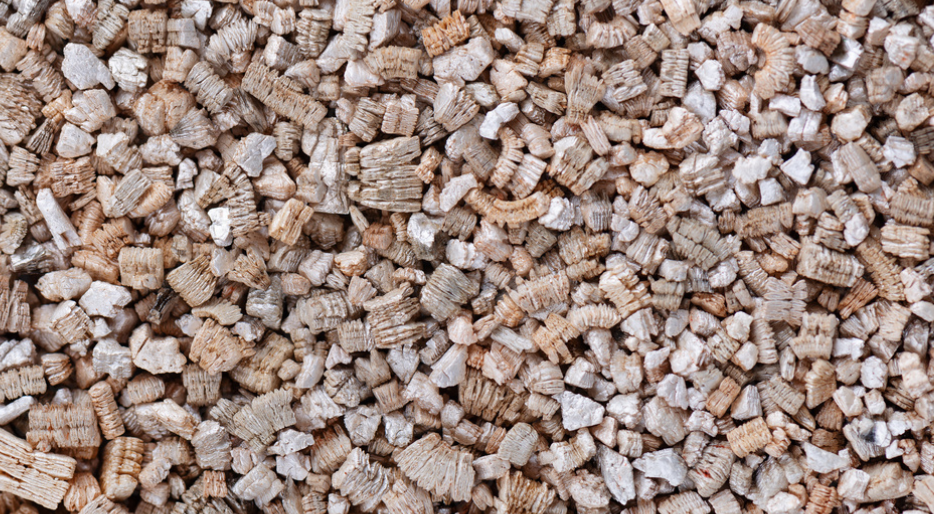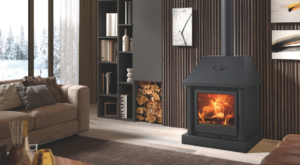

In the world of wood-burning stoves, as we could see in previous blogs, vermiculite has emerged as an essential element not only to generate heat efficiently, but also to establish a unique connection with the agricultural field. Playing a crucial role as an insulator in coatings, while in agriculture it is used to improve soil structure and encourage optimal plant growth.
In agriculture, vermiculite is used to improve soil structure, promote drainage, and retain moisture. These properties are critical for healthy plant growth, as well-aerated and well-draining soil promotes the development of a strong root system.
It acts as a support for nutrients, helping to maintain a proper balance of minerals for plant development. Its ability to retain water and nutrients benefits plant growth, making it a valuable component in horticulture and gardening.
As we have mentioned, the presence of these additional nutrients has a positive impact on soil quality, improving structure and water-holding capacity. Consequently, plants grown in its vicinity experience healthier growth and are better able to withstand adverse weather conditions.

Vermiculite, a natural mineral endowed with exceptional insulating properties, has become an indispensable component in the design of the latest wood-burning stoves. From its location in the combustion chamber to its presence in the insulating layers, vermiculite plays a crucial role in the thermal efficiency of these stoves.
Used in the construction of wood-burning stoves, vermiculite is heated during combustion, gradually releasing these nutrients in the form of steam. This vapor mixes with the surrounding air and settles on the ground, enriching the soil with essential elements.
This mineral is essential for improving the energy efficiency of wood-burning stoves, which contributes to the reduction of wood consumption and a lower emission of pollutants into the environment.

The connection between vermiculite and agriculture goes beyond its benefits to the soil. In a broader context, the use of vermiculite in wood stoves may also be linked to sustainable agricultural practices.
Some wood-burning stoves are used to cook food, and vermiculite, being an inert and non-toxic material, ensures that no harmful substances are released during the cooking process. This is especially relevant in rural areas where wood-burning stoves are commonly used for domestic use. Therefore, vermiculite not only contributes to energy efficiency, but may also be associated with healthier and more environmentally friendly agricultural and culinary practices.
In conclusion, the crossover between wood stove technology and agriculture, vermiculite presents itself as an essential bridge. Our stoves not only provide cosy warmth, but also contribute to the well-being of your farming environment. By choosing a wood stove with vermiculite, you are not only investing in your comfort, but also in the health and productivity of your land.
Wij hopen dat dit bericht als leidraad heeft gediend. Neem een kijkje op onze blog en vind oplossingen en aanbevelingen om u te helpen met uw open haard of houtkachel.
Bezoek onze online winkel voor Panadero houtgestookte fornuizen. Als u vragen hebt of hulp nodig hebt bij het kiezen van het juiste fornuis, aarzel dan niet om contact met ons op te nemen. We helpen u graag.
Artikelen van belang:
Als u het artikel goed vond, help ons dan om het te verspreiden 😊 . Klik op de knoppen hieronder en voel je vrij om het te delen op je sociale netwerken!
Bedankt voor het lezen!
↓ ↓ ↓ ↓


In our ongoing quest to offer the best heating solutions, we are pleased to announce an exciting addition to our online store: the Wood Stove

Wood stoves are an efficient option for heating the home, but it is essential to choose the right model based on the size of the

We offer you the best tips to combine a fireplace and a television in the same room.
Welcome to the basic information about cookies on the web page under the responsibility of the entity:
Panadero AB SL
A cookie is a small information file that is stored on your computer, smartphone or tablet every time you visit our website. Some cookies are ours and others belong to external companies that provide services for our website.
Cookies can be of various types: technical cookies are necessary for our website to function, they do not require your permission and are the only ones we have enabled by default.
The other cookies are used to improve our website, to personalise it based on your preferences, or to be able to show you advertising tailored to your searches, tastes and personal interests. You can accept all these cookies by clicking on the ACCEPT button or configure them or refuse their use by clicking on the COOKIE CONFIGURATION section.
For more information, please consult the COOKIES POLICY on our website.